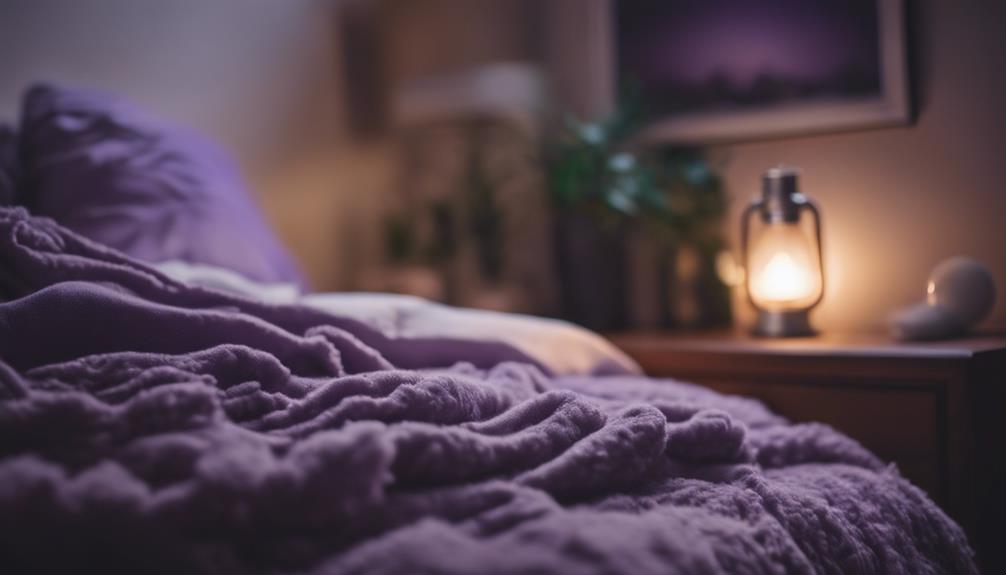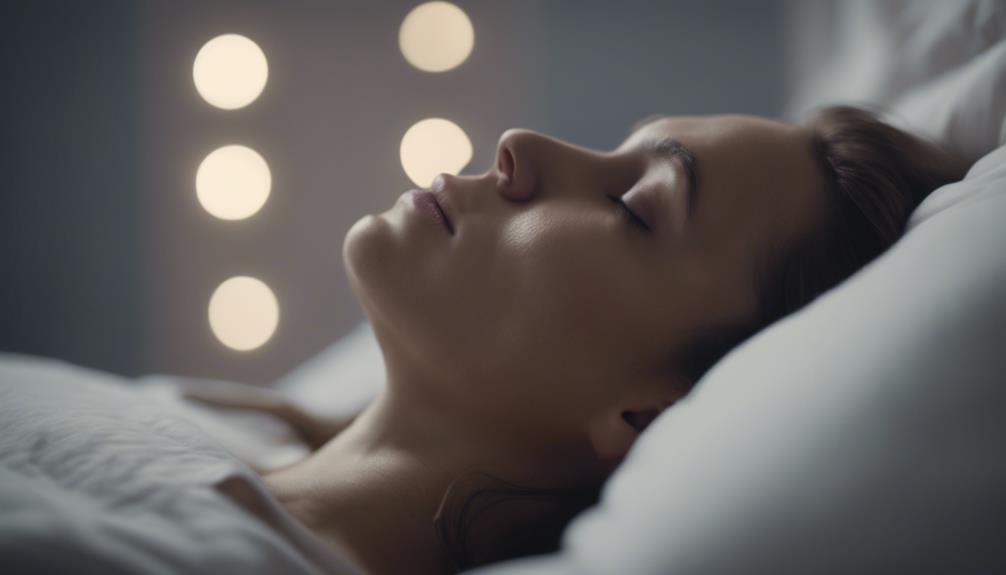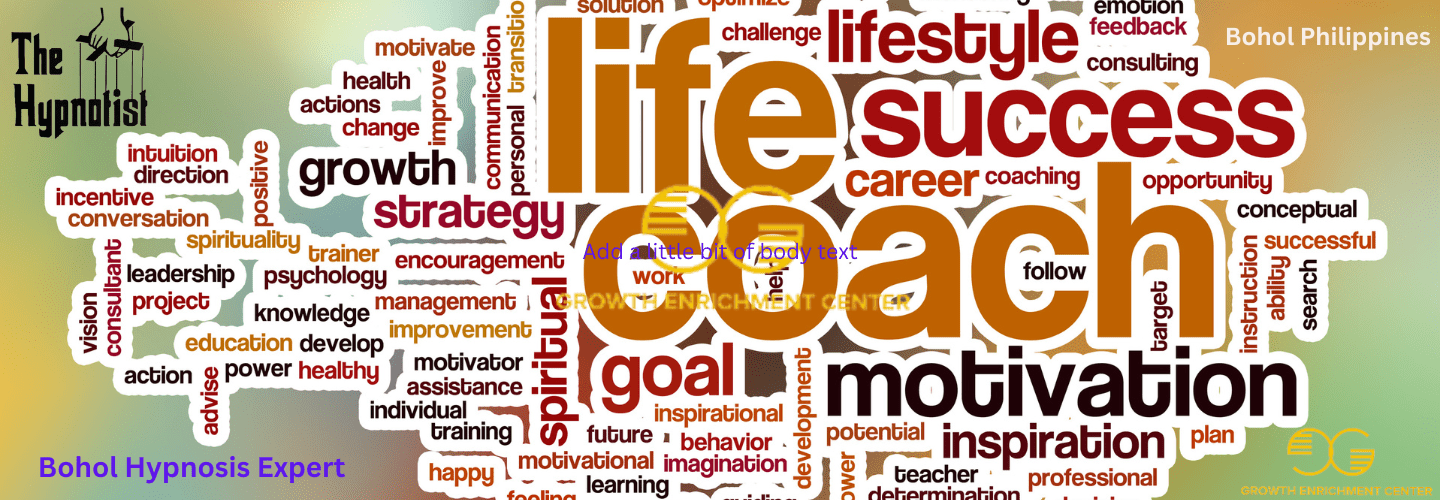
Enhance your sleep quality with these top 5 self-hypnosis scripts for insomnia relief. Try Progressive Muscle Relaxation for releasing tension, or Guided Visualization for a soothing mental landscape. Counting Down to Relaxation offers a peaceful environment, while Ocean Waves Hypnosis drowns out intrusive thoughts. Body Scan Meditation promotes body awareness for deep rest. These scripts are tailored to help you fall asleep easily.
Key Takeaways
- Progressive Muscle Relaxation: Calmness for sleep.
- Guided Visualization: Soothing mental landscape.
- Counting Down Technique: Relax body and mind.
- Ocean Waves Hypnosis: Serene mental space.
- Body Scan Meditation: Release tension for sleep.
Progressive Muscle Relaxation Script
Wondering how progressive muscle relaxation can help you find relief from insomnia? Incorporating this technique into your bedtime routine can greatly improve your sleep quality. By systematically tensing and relaxing different muscle groups in your body, you can release built-up tension and stress, promoting a sense of calmness conducive to falling asleep.
To enhance the effectiveness of progressive muscle relaxation, consider pairing it with sleep affirmations. Positive statements about sleep can help reframe any negative thoughts or anxiety surrounding bedtime, allowing your mind to relax and drift off peacefully.
Additionally, incorporating deep breathing techniques can further amplify the relaxation response in your body. Deep, slow breathing calms the nervous system, signaling to your body that it is time to unwind and prepare for rest.
Incorporating these methods into your nightly routine can create a powerful combination for combating insomnia. By engaging in progressive muscle relaxation, utilizing sleep affirmations, and practicing deep breathing techniques, you can pave the way for a more restful and rejuvenating night's sleep.
Guided Visualization for Deep Sleep

Interested in enhancing your sleep quality through a powerful mental exercise? Guided visualization for deep sleep can be a potent tool to help you achieve a restful night. By engaging in dream exploration during this practice, you can create a soothing mental landscape that promotes relaxation and prepares your mind for a restorative slumber.
During guided visualization, you can incorporate sleep affirmations that reinforce positive thoughts and beliefs about your ability to sleep deeply and peacefully. By focusing on calming imagery and repeating these affirmations, you can help quieten any racing thoughts or anxieties that may be hindering your ability to fall asleep.
Allow yourself to immerse in a world of tranquility as you visualize yourself drifting off into a serene dreamland. By harnessing the power of your imagination and combining it with sleep affirmations, you pave the way for a night of deep, uninterrupted rest.
Engaging in guided visualization before bedtime can help signal to your body and mind that it is time to unwind and embrace a rejuvenating sleep experience.
Counting Down to Relaxation

When seeking to further enhance your relaxation techniques for better sleep, incorporating a method such as counting down to relaxation can be a valuable tool. This simple yet effective technique can help calm your mind and body, preparing you for a restful night's sleep.
To make the most out of counting down to relaxation, consider the following tips:
- Breathing exercises: Before you begin counting down, take a few moments to focus on your breathing. Inhale deeply through your nose, hold for a few seconds, and then exhale slowly through your mouth. This can help relax your body and quiet your mind.
- Create a peaceful environment: Find a quiet and comfortable space where you can practice counting down to relaxation without distractions. Dim the lights, play calming music if desired, and make sure your bedroom is conducive to sleep.
- Sleep affirmations: Incorporate positive affirmations into your countdown routine. Repeat phrases like 'I am calm and at peace' or 'My body is ready for rest' as you count down, reinforcing a sense of relaxation and readiness for sleep.
- Consistency is key: Practice counting down to relaxation consistently each night to establish a bedtime routine that signals to your body it's time to unwind and prepare for sleep.
Ocean Waves Hypnosis for Insomnia

Utilizing ocean waves hypnosis can be a soothing and effective method for relieving insomnia and promoting restful sleep. Sleep hypnosis, specifically with the calming sounds of ocean waves, offers a natural way to calm the mind and body, allowing for a deeper state of relaxation conducive to falling asleep.
The rhythmic sound of waves crashing against the shore can help drown out intrusive thoughts and create a peaceful atmosphere for the mind to unwind.
Incorporating relaxation techniques such as ocean waves hypnosis into a bedtime routine can signal to the brain that it is time to wind down, making it easier to shift into a state of restful sleep.
The gentle ebb and flow of the waves can act as a meditative focal point, guiding individuals away from stress and anxiety towards a more serene mental space.
Body Scan Meditation for Restful Sleep

Experience deep relaxation and prepare your body for a restful night's sleep with the practice of Body Scan Meditation. This mindfulness technique involves focusing on each part of your body sequentially, bringing awareness to physical sensations and promoting relaxation. Body Scan Meditation can be a powerful tool to calm a racing mind and release tension, making it particularly beneficial for those struggling with insomnia.
Here are four key points to keep in mind when practicing Body Scan Meditation for restful sleep:
- Start at your feet: Begin by directing your attention to your toes, slowly moving up through each part of your body.
- Mindful breathing: Pay attention to your breath as you scan each body part, inhaling and exhaling deeply to enhance relaxation.
- Relaxation techniques: Use progressive muscle relaxation or visualization to release any tension you encounter during the body scan.
- Practice regularly: Consistent practice of Body Scan Meditation can help train your body and mind to relax more easily, leading to improved sleep quality.
Frequently Asked Questions
Can Self-Hypnosis Be Effective for Chronic Insomnia?
Self-hypnosis effectiveness for chronic insomnia can provide long-term benefits by promoting relaxation, reducing anxiety, and improving sleep patterns. Incorporating self-hypnosis techniques into a bedtime routine may offer a natural and holistic approach to managing sleep disturbances.
Is It Safe to Practice Self-Hypnosis for Sleep?
Beginning the journey of self-hypnosis for sleep prompts an essential exploration of ethical considerations and potential risks. Ensuring safety involves understanding personal limitations, seeking professional guidance, and maintaining a balanced approach to practice.
How Long Does It Take to See Results With Self-Hypnosis?
In considering self-hypnosis success rates, the time commitment for self-hypnosis varies. Results are often noticeable within a few weeks with consistent practice. Patience and dedication to the process are key for achieving desired outcomes.
Can Self-Hypnosis Be Combined With Other Sleep Remedies?
Just as a harmonious melody blends different notes, combining hypnosis with medication or meditation can enhance sleep remedies. Careful coordination under professional guidance can optimize results and offer a multifaceted approach to insomnia relief.
Are There Any Potential Side Effects of Self-Hypnosis for Insomnia?
When considering self-hypnosis for insomnia, one must be mindful of potential risks such as increased susceptibility to suggestion, temporary drowsiness, and the possibility of heightened emotions surfacing. Long-term effects may include dependency on hypnosis for sleep.
Conclusion
In a study conducted by the National Sleep Foundation, it was found that approximately 35% of adults in the United States report experiencing insomnia symptoms.
Utilizing self-hypnosis scripts can be an effective tool for managing insomnia and improving sleep quality. By incorporating techniques such as progressive muscle relaxation, guided visualization, and body scan meditations, individuals can enhance their ability to achieve deep and restful sleep.
Try out these 5 best self-hypnosis scripts for insomnia relief and experience the benefits for yourself.





